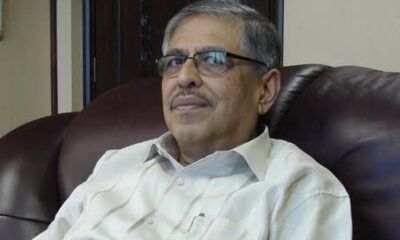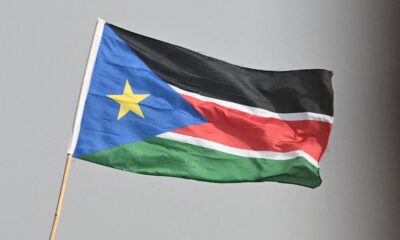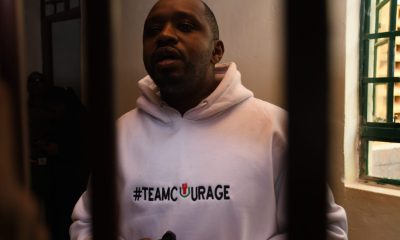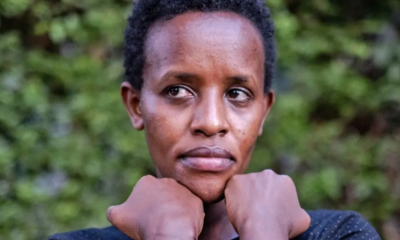Africa
‘They Inserted Things Into Me Down There,’ Ugandan Activist Agather Atuhaire Recounts Horrifying Ordeal in Tanzanian Custody
Atuhaire revealed that the perpetrators did not use their sexual organs, which she described as a small mercy amid the violence.

DAR ES SALAAM, Tanzania — Ugandan journalist and activist Agather Atuhaire has detailed a harrowing account of torture and abuse at the hands of Tanzanian authorities following her detention alongside Kenyan activist Boniface Mwangi.
Speaking at a press conference on June 2, 2025, Atuhaire described a brutal ordeal that included physical assault, sexual violation, and being overdosed on painkillers in an apparent attempt to mask the severity of her injuries.
Atuhaire and Mwangi were detained by Tanzanian state officers while staying at a hotel in Tanzania, an operation she claims was facilitated by hotel staff.
The two were held incommunicado for several days before being released at border points—Atuhaire at the Mutukula border with Uganda and Mwangi at the Horohoro border with Kenya.
The arrests, which Atuhaire said came without clear charges, have sparked outrage across East Africa, raising questions about state impunity and the erosion of regional freedoms.
“They removed all my clothes and left me in my underwear. They beat me. Then I was taken to a clinic, and they inserted stuff into me,” Atuhaire recounted, her voice trembling as she described being forced to lie flat while unknown substances were injected and inserted into her body. “I had no strength left to resist.”
Atuhaire revealed that the perpetrators did not use their sexual organs, which she described as a small mercy amid the violence.
However, the physical and emotional scars remain. “I couldn’t walk for three days. The soles of my feet were so swollen, it felt like my skin would burst,” she said, describing the pain that left her incapacitated.
In what she believes was an attempt to cover up the extent of her injuries, Atuhaire said Tanzanian officers administered excessive doses of painkillers.
“They kept giving me painkillers. They almost overdosed me,” she explained, noting that a medical note prescribed a dosage of “one times two,” while she was given the drugs up to four times a day.
“They started to panic that I might not leave in a physically stable condition. They had to make sure I walked out looking like a human being.”
The detention began with hours of interrogation at an immigration office and a police station, where Atuhaire and Mwangi were bombarded with questions unrelated to their presence in Tanzania.
“They went through my passport and were angered by the number of visas I had. They accused me of being funded by whites to destabilize the country,” Atuhaire said. One officer even remarked, “I should become an activist too if it gives this kind of life.”
Atuhaire’s ordeal escalated when she was blindfolded, a moment she described as nearly triggering a panic attack.
“I had always thought that if I were ever captured, I would carry poison to avoid going through torture. But in that moment, I realized I had to surrender to whatever would happen,” she said.
The activist pointed to a Tanzanian official, identified as Faustin Mafia, who allegedly handed her and Mwangi over to “thugs” from police custody, highlighting what she called a “chilling level of state-sanctioned impunity.”
Unlike in Uganda, where abductions are often covert, Atuhaire noted that Tanzanian authorities acted openly, showing no fear of accountability.
Atuhaire criticized both Tanzanian and Ugandan governments for their complicity and inaction. “My government didn’t even pretend to care. For them, it was good riddance—someone else was getting rid of a headache,” she said.
She also condemned the broader East African leadership, stating, “We have no institutions. No police that protect citizens. No government. Just ourselves.”
Despite the trauma, Atuhaire credited ordinary East Africans for her release, saying their protests and public outcry pressured authorities.
“You saved us. The noise you made made them panic. We were not invisible like the Tanzanians they abduct, torture, and kill quietly,” she said.
Atuhaire called for justice and accountability, challenging Tanzania’s reputation as a peaceful nation.
“Tanzania has hidden behind a facade of peace for so long. But the mask is off,” she said.
“Maybe the pain we went through was so the world could know what ordinary Tanzanians go through. Maybe we had to suffer so that this impunity can be checked—so that no East African has to go through this again.”
The incident has reignited debates about political freedoms and state violence in the region, with activists and human rights groups demanding investigations into Atuhaire and Mwangi’s treatment.
Kenya Insights allows guest blogging, if you want to be published on Kenya’s most authoritative and accurate blog, have an expose, news TIPS, story angles, human interest stories, drop us an email on [email protected] or via Telegram
-

 Business2 weeks ago
Business2 weeks ago‘They’re Criminals,’ Popular Radio Presenter Rapcha The Sayantist Accuses Electric Bike Firm Spiro of Fraudulent Practices
-

 Business1 week ago
Business1 week agoIt’s a Carbon Trading Firm: What Kenyans Need to Know About Spiro’s Business Model Amid Damning Allegations of Predatory Lending
-

 Business1 week ago
Business1 week agoManager Flees Safaricom-Linked Sacco As Fears Of Investors Losing Savings Becomes Imminent
-

 News1 week ago
News1 week agoWoman Accused in High Defamation Blames AI As Case Exposes How Mombasa Billionaire Mohamed Jaffer Allegedly Sponsored Smear Campaign Linking Joho’s Family To Drug Trafficking
-

 Investigations2 weeks ago
Investigations2 weeks agoDisgraced Kuscco Boss Arnold Munene Moves To Gag Media After Expose Linking Him To Alleged Sh1.7 Billion Fraud
-

 Africa2 weeks ago
Africa2 weeks agoDisgraced Oil Trader Idris Taha Sneaks Into Juba as Empire Crumbles
-

 Investigations2 weeks ago
Investigations2 weeks agoFraud: How Sh235 Million Donor Cash For Nyamira Residents Was Embezzled Through Equity Bank Under Governor Nyaribo’s Watch
-

 Investigations1 week ago
Investigations1 week agoIntelligence Report Links Budding Politician James Mabele Magio To International Scammers Ring






















